Faiths Under Fire: The Conspiracy Theorists Inflaming Religious War in Nigeria
The struggle for political and economic power has turned Muslims and Christians against one another on many occasions in Nigeria. Now, conspiracy theorists are turning nearly every conversation into religious debates through information manipulation and misinformation. We analyzed some claims.
He picks up news stories about the humanitarian crises in Nigeria and twists narratives with bloated headlines, adding some religious colouration to feed the tasteful yearning of his audience. On his social media accounts, he has shared countless distorted stories, blemishing facts with fiction — and many among his thousands of followers consume them, believing they are true.
Robert Spencer, an American author who describes himself as an Islamophobic activist, uses his website and social media pages to share or mint inciting stories against Muslims, Islam, violent jihad, terrorism, and insurgency. His website, JihadWatch, regularly publishes stories lifted from other websites, distorting narratives and suspiciously promoting his Islamophobic ideologies.
For almost every news content about attacks in Nigeria, Robert passes inflammable comments stirring up emotions in an attempt to paint violent events in the country as a part of government-backed genocidal campaigns against Christians. After claiming Muslims gruesomely murdered a Christian pastor and 37 others in one of his stories on JihadWatch, he prejudicially categorised all rural terrorists, also known as bandits, as Fulani jihadists, accusing the media of shielding the Muslim attacks against Christians globally.
“‘Bandits’ and ‘herdsmen’ are the Nigerian media’s code for Fulani jihadists, just as the British media uses ‘Asian grooming gangs’ for Muslim rape gangs, and the French media refers to ‘youths’ rather than ‘jihadis’,” he claimed. “Everywhere, the media has agreed that its primary job is to cover for Islam and the crimes committed in its name and in accord with its teachings.”

Nigeria, a heterogeneous country with hundreds of ethnic groups, has Islam and Christianity as its dominant religions.
In the North and parts of southern Nigeria, violent conflicts, rural terrorism, and an insurgency are causing massive humanitarian crises, with thousands of lives lost or displaced. Each region of the country seems to have peculiar issues fueling violent killings and displacements. Calls for self-rule are driving new terror in the South East, while illegal oil bunkering and theft are causing chaos in the South-south. In the north-central region, conflicts over land and resources between farmers and herders are leading to deadly clashes and a worsening humanitarian crisis.
Robert and many other religious disinformation merchants consistently raise false alarms, taking advantage of the diversity to escalate existing ethnic and interfaith tensions in Nigeria. The struggle for political and economic power has turned Muslims and Christians against one another on many occasions. When Boko Haram and other extremist groups emerged, religious sanity suffered exasperating setbacks as violent Islamists launched a campaign of bloodshed, killing and kidnapping in the name of religion. “[But] victims are both Muslims and Christians,” remarked the Humanitarian Aid Relief Trust, a global think tank documenting the effects of the multifaceted conflicts in Nigeria.

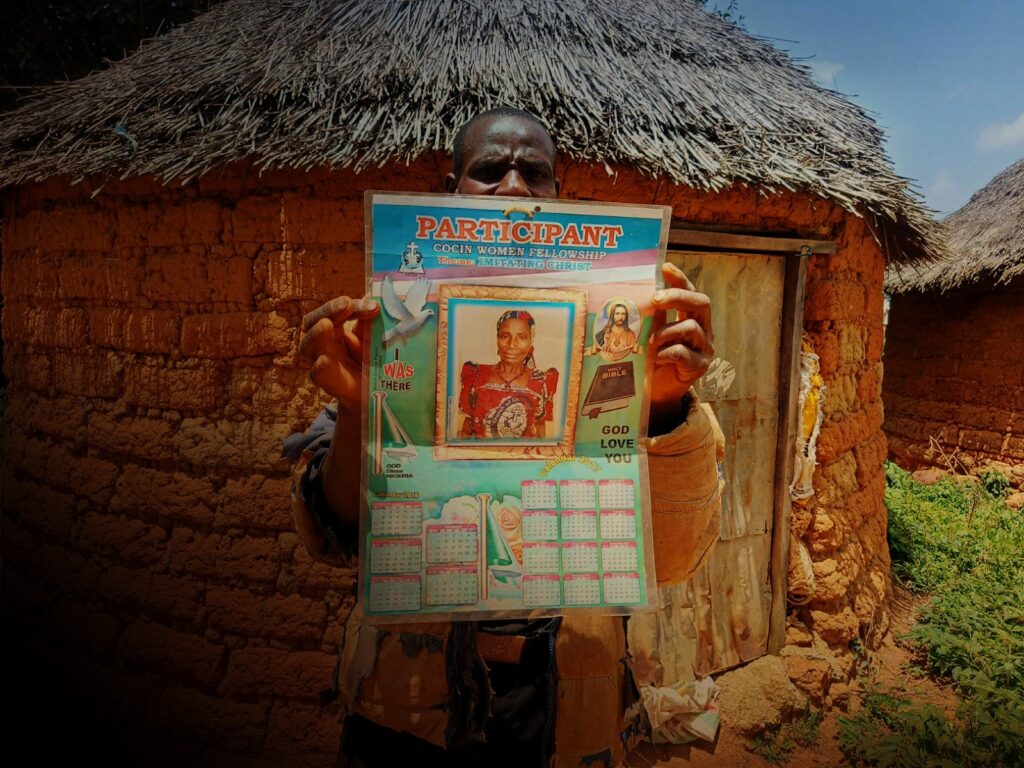
Religious colouration
In June 2018, CNN reported how dozens were killed while over 50 houses were burned, noting that the incident had “the potential to exacerbate ethnic tensions” in an increasingly volatile Plateau state. “Eighty-six persons all together were killed, six people injured, fifty houses burnt,” the platform quoted the police saying following the attack.
When Robert published the same story on JihadWatch, citing CNN as his source, he wrote the headline this way: Muslims murder 86 Christians, burn 50 houses. Other local and global news platforms reported the story, as documented by CNN, but Robert subtly faulted them for not reporting it as an attack against Christianity in Nigeria.
“In the first paragraph, we learn that there were ‘attacks,’ and in the second paragraph, we learn that the attacks were carried out by ‘armed herdsmen.’ In the fourth paragraph, we find that the herdsmen are ‘mostly Muslims,’ while the victims are ‘predominantly Christians’,” he wrote, critiquing the CNN report. “Never in this story do we learn that Nigerian Church leaders have characterised the attacks by Fulani herdsmen as a war ‘by Islam to eliminate Christianity’.”
The above scenario exemplifies how Robert forges narratives from original stories, focusing on regions with ethnic and religious volatility, such as the Northeast and the North-central. Using toxic media framing and rhetorics, he suggests that Islam preaches violence and terrorism to justify his content describing Muslims generally as terrorists.
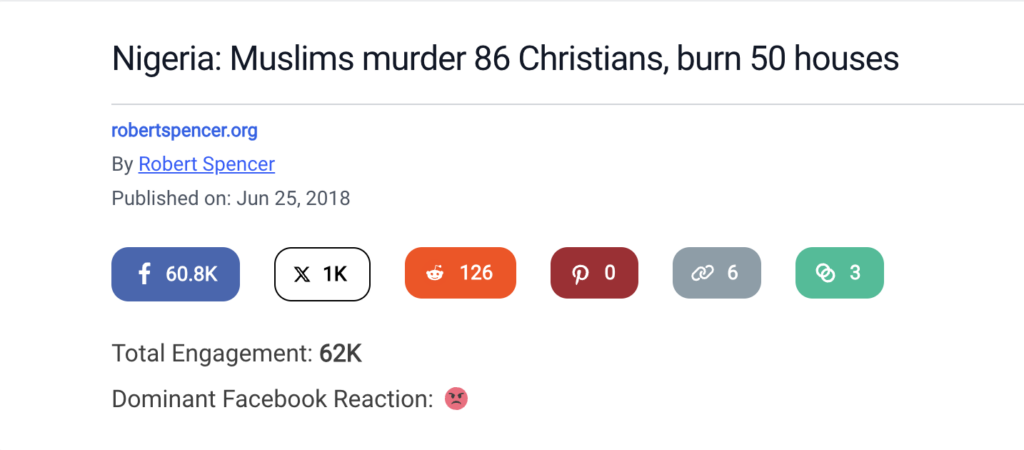

He has so far embellished hundreds of stories about violent conflicts in Nigeria to fit this narrative. In one instance, he claimed Muslims murdered 38 people “simply because they were Christians” in the Middle Belt region. Elsewhere, he insinuated that Muslims murdered at least 13 Christians in an ongoing war “by Islam to eliminate Christianity”. In the report, he inferred that there was a deliberate effort by menacing Muslims to wipe out the Christian population in Nigeria, using a series of attacks that occurred in Kaduna as anecdotes following the farmer-herder violence that broke out in the state. Citing Morning Star News, an international medium that concerns itself with reporting about Christianity, Robert claimed: “Muslim Fulani herdsmen attacked a cluster of predominantly Christian villages in Kaduna state last week, killing at least 13 Christians and scattering members of three churches”.
However, the violent clash, which Robert religiously coloured, was motivated by ethnic division and the quest for land and water resources. According to the Assessment Capacity Projects (ACAPS), an international humanitarian network, the damning climate crises resulted in land degradation in many Nigerian communities, scaling up the competition over scarce fertile land, and causing the farmer-pastoralist conflict. The report noted that ethno-religious differences have also escalated the violence, aggravating the humanitarian crises in many parts of this country.
We also found many instances of Muslims distorting narratives to fit into their religious agenda. They also forged anecdotes or blamed Christians for orchestrating unprovoked attacks against Muslims, particularly when it was clear it was not religiously motivated. We found most of the Muslim disinformation actors on the prowl on Facebook and X.
Disinformation on the prowl
Robert is not alone on the mission to propagate religious conspiracy theories, inflaming existing rancour among the faithful of Nigeria’s dominant religions. Morning Star News, Christianity Today and Anglican Ink, among many other religious-affiliated websites or blogs participated in the colouration of terrorist raids, communal clashes or the common farmer-herder crisis as clandestine attacks against Nigeria’s Christian population.
On the Morning Star News website, for instance, HumAngle x-rayed dozens of content and observed a pattern of hyperbolic painting of violent attacks in Nigeria, making it seem like the Christians are targeted for attacks to erase their existence. However, most of the stories were manipulated, with the authors artfully hiding the truth. Sometime in 2018, the Morning Star News published a story titled, Muslim Fulani Herdsmen Kill 13 Christians, Wound Three in Central Nigeria. The headline was, however, a distorted version of a communal attack in the Kublen village of Plateau state. Premium Times, P.M. News and other credible local press outfits reported that the attack was orchestrated by menacing herdsmen.
But accuracy didn’t matter: The Morning Star News reworded the headline of the story with an inciting adjectival phrase — “Muslim Fulani Herdsmen” — making it appear like it was a religiously motivated attack.
Crisis24, an insight and intelligence medium, reported the story, describing the attackers as “armed assailants” and noting that the police suspected the attackers to be “herdsmen”. In a contextual analysis of the situation, Crisis24 stated that “ethnic and sectarian clashes are common in Nigeria. Central Nigeria and adjacent areas have become the scene of almost daily clashes between farmers and the largely nomadic herders in a battle for land and resources”.
Amid raging communal violence in Plateau last year, the Morning Star News published yet another inciting report with some religious undertone. Claiming “terrorists” killed 37 Christians in the state, the author collated reports of attacks in August and September 2023 in the Mangu area of Plateau. The report repeatedly and vaguely claimed “Fulani herdsmen and other terrorists”, but failed to describe who the other terrorists were. Although most of the sources featured in the story described the attackers as herdsmen, the author made noticeable efforts to make it appear like it was another Islamist attack on the Christian community in the state.
Although information manipulators have tried to paint recent attacks in Plateau as a jihadist movement against Christianity, HumAngle’s on-site reporting showed that the bloody communal clashes were driven by a thirst for land and water resources, spurring deadly feuds between the native farmers and the Fulani pastoralists in the area. In a recent investigation into how disinformation mercenaries inflamed ethno-religious crisis in the state, HumAngle described the warring ethnic groups as both victims and villains. Fights over land resources are often interpreted as interfaith clashes due to the religious and ethnic identities of the two parties.
Another website that uses tactics similar to Morning Star News is Christianity Today, a magazine that listed Nigeria among the 50 countries where it’s hardest to follow Jesus in 2023. Unlike Morning Star News and Robert’s JihadWatch, Christianity Today seems more organised and more careful with word choices. In most cases, the platform amplifies forged anecdotes and distorted narratives by other sources, helping them spread religious propaganda and conspiracy theories. It also reports strictly from a Christian angle without considering the other sides of the story.
For instance, the platform amplified the Islamisation agenda theory when President Bola Tinubu picked a Muslim running mate in an analytical story. In another article, the medium craftily helped the Morning Star News to propagate the religious colouration of violent attacks in north-central Nigeria, suggesting that Christians were being killed solely for their faith. Although it quoted some data showing ethno-nationalists in the southeast region attacked people of other religions, such as Muslims, the Christian Today report relied so much on distorted narratives curated by the Morning Star News.
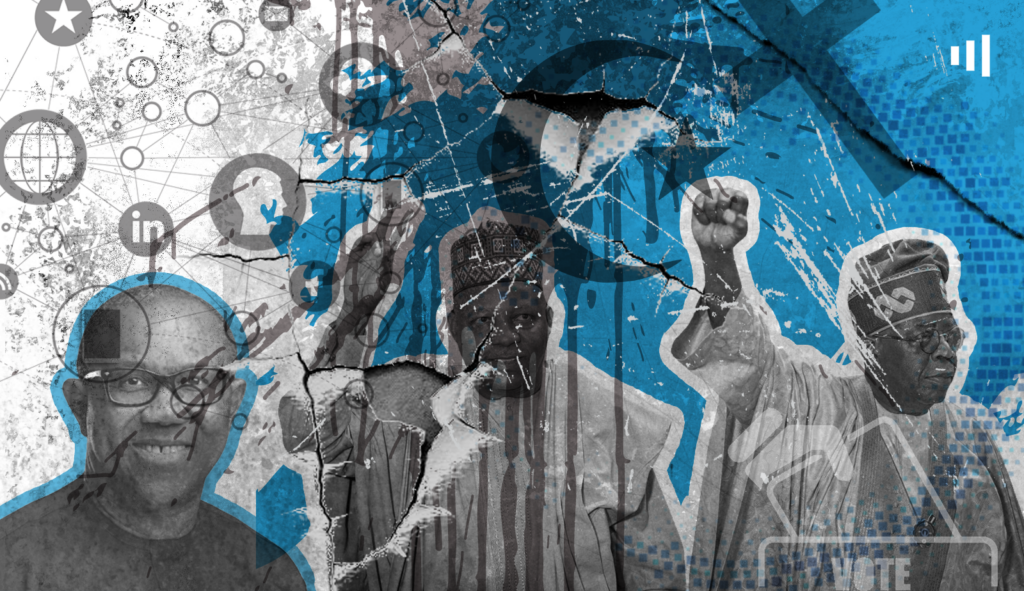
Trolls in religion’s name
The 2023 general elections seemed to have exploded raging ethnic and religious fire across Nigeria, more than ever before. The Muslim-Muslim presidential ticket flagged by Tinubu (and his running mate) and the public display of religious biases by other candidates, such as Peter Obi, who was accused of declaring the election a religious war, inflamed existing interfaith hatred. Now, conspiracy theorists are taking advantage of this situation on social media, turning nearly every conversation into religious debates, stirring up resentment and hate speeches in the civic space.
Speculations about the possible Islamisation of the country resurfaced during political campaigns. Tinubu, a man accused of acute graft, drug dealing and forgery, had to add religious bigotry to his accusation bag. Former President Muhammadu Buhari had also been accused of attempting to Islamise Nigeria on many occasions during his administration, especially as violent extremism became more notorious under his watch. Although unconfirmed, the allegations gave Robert and other religious conspiracy theorists a ground to appeal to their followers. Robert’s JihadWatch, for instance, re-echoed a damning, but misleading report titled, “Muslims slaughter 700 Christians as ‘farewell gifts’ to outgoing president.”
Relying on a report by Intersociety, a Catholic-inspired think tank, based in southeastern Nigeria, Robert claimed hundreds of Christians were killed in 2023 by government-backed jihadists as a farewell celebration to the outgoing President Buhari. They claimed the massacres happened in Plateau, Benue and Kaduna states. On two different occasions, HumAngle punctured reports produced by Emeka Umeagbalasi, the leader of Intersociety, about the alleged persecution and execution of Christians in Nigeria. In his report, Robert presented Nigeria as a wild killing field of Christian worshipers, with strong support from the state and institutions across the country.
Meanwhile, Emeka’s report relies on distorted narratives and stories published by websites like the Morning Star News, JihadWatch, Christianity Today and other pro-Christian organisations. As documented in our recent investigation, Emeka’s bi-annual reports about the killing of Christians were full of factual inaccuracies and exaggerations.
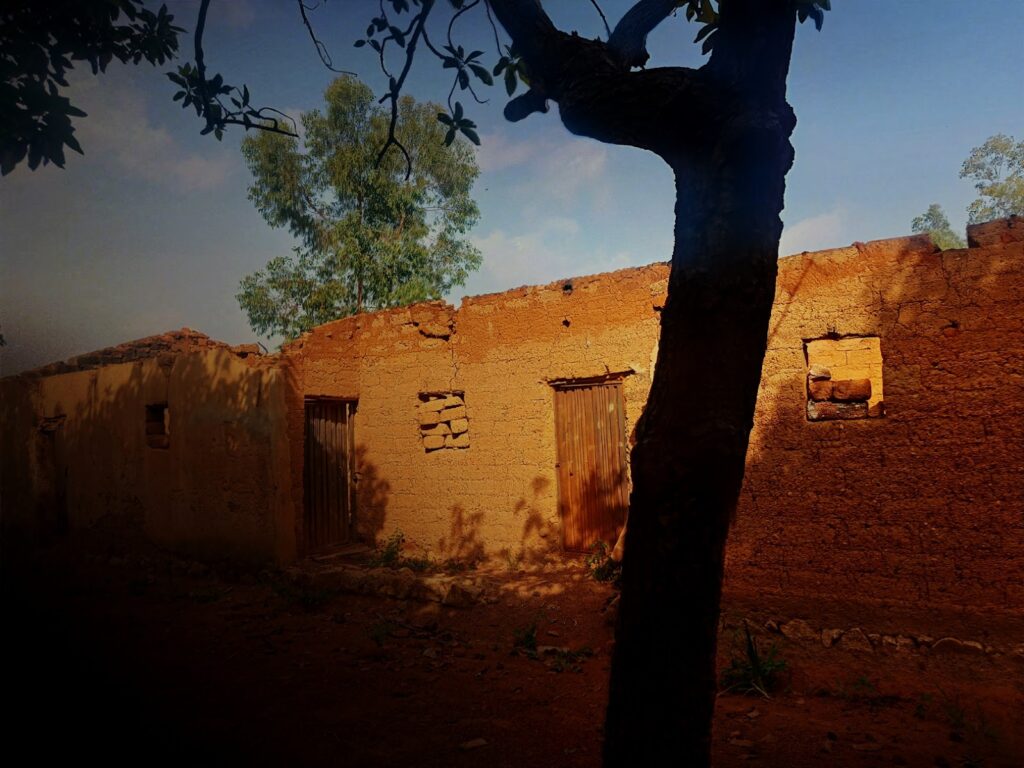
Other side of the coin
Just as we have many doing this for Christianity, many have also chosen to make violent events in parts of northwestern Nigeria appear like a clandestine move by Christians in authority to kill Muslims.
On the night of Dec. 3, 2023, a group of Muslims gathered to celebrate the Maulud (birthday of the Prophet Muhammad) on a field in Tudun Biri, a village in the Igabi area of Kaduna. Something terrible happened a few hours into the religious procession, as a military drone shelled the venue, killing scores of civilians at the event. Over 120 Muslims died, while 66 persons were reported badly injured. The Army would later claim responsibility for the attack, admitting that they got the wrong intelligence that terrorists were going to raid the area and misfired, killing unarmed civilians, who happened to be some Muslim worshipers.
However, the military’s explanation would not stop conspiracy theorists from manipulating the event and twisting the narrative to fit their religious interests. Some social media influencers portrayed Valentine Okoro, the General Officer Commanding (GOC) of the One Division Nigerian Army in Kaduna, as orchestrating the killing of the Muslim worshipers, being a Christian. Among many other social media trolls, one X (Twitter) user, whose post went viral at the time, named Okoro as the killer and incited other Muslims on his page against the senior army officer.
“Horror👿his full name is Major Valentine Uzochukuw Okoro,” the X user exclaimed, with his post gathering about two million views and thousands of likes and comments. “The face of a person responsible for the killing of more than 120 Muslim worshippers in Kaduna last night.”
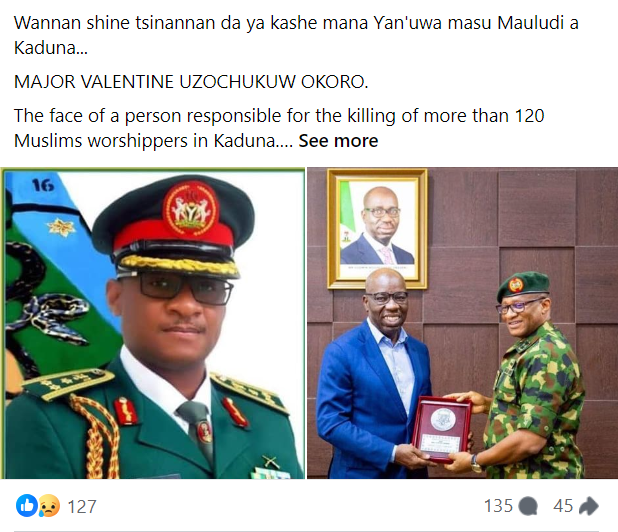
Several other X users also went on an information manipulation spree on the matter, with vigorous attempts to make it seem a senior Christian army officer used his influence to murder dozens of Muslim worshipers in defence of his religion. When a Nigerian newspaper published a story about the army’s explanation of how its drone mistakenly killed unarmed civilians, one X user, with a handle belonging to a local Islamic television station, rewrote the headline of the story this way: Nigerian Army admits mistakenly dropping bombs on Kaduna villages from combat drones, ‘killing 126 Muslims’.
We found a campaign on Facebook where one Jafar Afuwa spread the misleading claim on a public forum with more than 144,000 members in the local Hausa language. “This is the cursed person that killed our brothers and sisters celebrating the Maulud in Kaduna,” he posted, also attaching Okoro’s picture. More than 130 people commented on the post, cursing the army officer as 45 others shared it on their platforms.
Other social media pages including a popular blog, RNC Hausa, propagated this same claim, saying, “He led the massacre of our over 120 Muslim brothers and sisters in Tudun Biri in Kaduna.” The comment section of the post was filled with curses against Okoro. The post received 53 interactions, and a sentiment analysis of the comments showed that they were mostly negative as the account users cursed the Army commander.
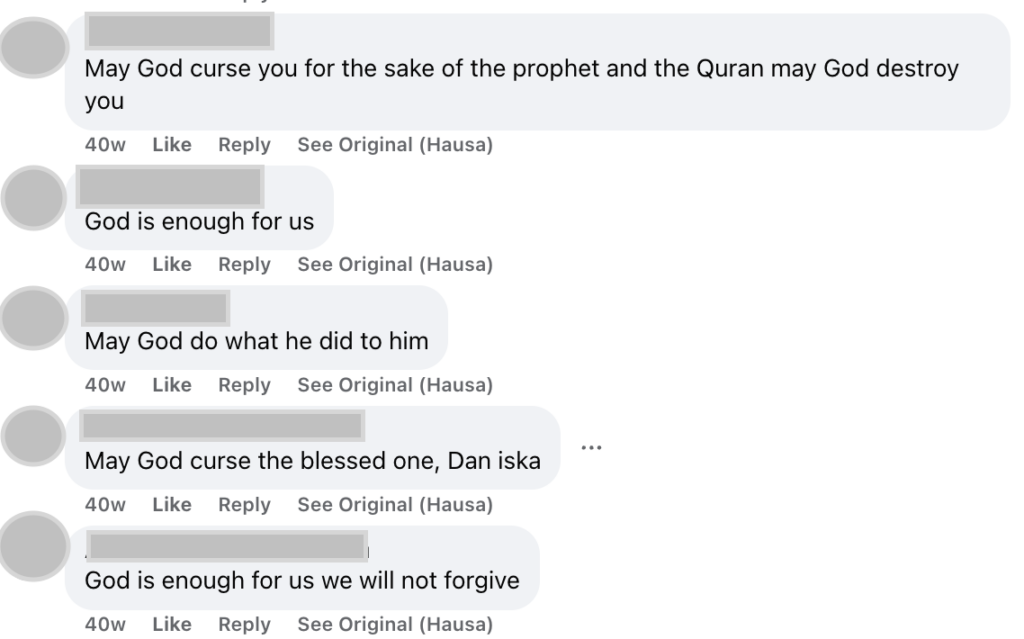
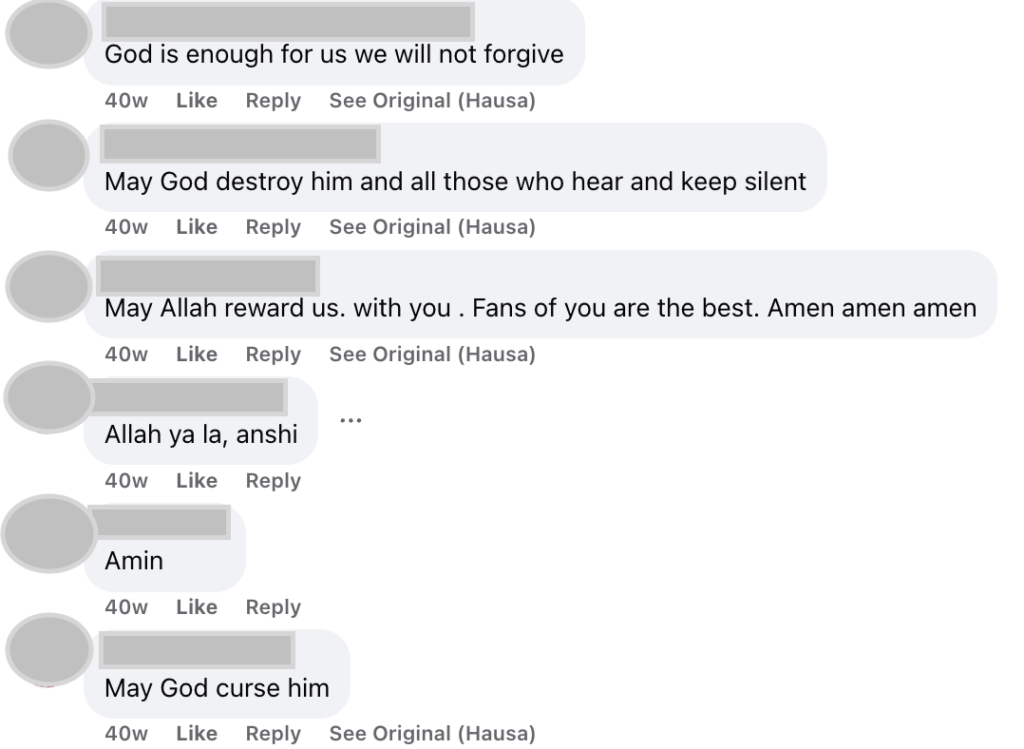
Violent consequences
Using Robert and co’s pattern of twisting conflict attack with religious colouration, other social media influencers were found distorting narratives to make Muslims appear like the victims and Christians the villains. In a series of attacks that happened in Zango Kataf, an area in northwestern Kaduna state, Christians were accused of killing Muslims for their faith. After a violent event in 2020, a social media influencer, known for spreading religious hate speech and disinformation, claimed Muslims were being targeted for murder.
“Despite the signing of the peace pact on August 22, 2020, Muslims and Fulanis in Zangon Kataf, Southern Kaduna were gruesomely murdered in a guerilla-style killing,” the X user claimed, urging others to pass on the information. “There’s no noise, no mass or media outrage, no Twitter trends. Retweet and pass it around let their voice be heard.” In a similar post, the X user accused the media of taking bribes to paint Muslims in Kaduna as the aggressors when they are actually the victims. “This is the current reality of the minority Muslims in Southern Kaduna. They’re quietly getting killed and chased out of their homes after having their properties destroyed,” he claimed.
However, an investigation revealed the true cause of the armed violence in Southern Kaduna state. The report noted that the crisis is about the indigene-settler dichotomy in a state where the indigenous people are mostly Christians while the settlers, who are majorly Hausa-Fulani, practise Islam. Accounts of the violence had been dominantly a single perpetrator-victim narrative until the on-site report revealed that “both sides had suffered human and material losses over the years and were equally engaging in targeted attacks on one another, creating a cycle of reprisals.”
The former Governor of the state, Nasir El-Rufai, once blamed the media for overhyping the crisis in Zango Kataf, noting that the protracted violence in the area was largely due to land ownership, fight over supremacy and indigene-settler dichotomy, as Premium Times’ investigation revealed.
“The killings are usually reprisals,” Umar Muri, the police commissioner in Kaduna at the time, was quoted as saying. “When one man is killed, his people assume it is his neighbour. Instead of reporting, they take the laws into their hands.”
Information manipulation of violent events in Nigeria with religious colouration seems to have its downsides, according to disinformation and conflict reporting experts. Apart from fights over land resources, hate speeches, claims and counterclaims are other contributory factors to the survival of religious conflicts in southern Kaduna, said Favour Chukwuemeka, who explored the intersection of the ethno-religious crisis in Southern Kaduna and the Abrahim-Lot narrative in a research paper.
“The exchange of war-provoking statements from both the leaders of the Christian Association of Nigeria and the Islamic leaders has fuelled the reoccurrence of the war and cold war in southern Kaduna,” the author said.
This article was produced through a collaboration between HumAngle and Code for Africa’s AAOSI programme. The AAOSI initiative is a collaborative effort to empower media and NGOs in African countries to combat disinformation and propaganda through training and resources, aiming to strengthen information integrity and foster collaboration among investigators in the region.
The article discusses the manipulation of news and religious disinformation campaigns in Nigeria, focusing on the actions of American author Robert Spencer and his website JihadWatch.
Spencer and others twist stories about violent conflicts in Nigeria to portray Muslims as aggressors and Christians as victims, heightening ethnic and religious tensions.
Credible reports often attribute these conflicts to resource disputes, but narratives from sites like Morning Star News and Christianity Today perpetuate the idea of religiously motivated violence.
The misinformation is not confined to one side; Muslims also distort events to depict Christians as instigators of violence. Both sides use social media to spread false claims, which inflame tensions and provoke violence.
The article highlights how the 2023 general elections exacerbated these issues, with conspiracy theories about Islamisation and political biases fueling further discord.
The piece underscores that these manipulated narratives contribute significantly to Nigeria's ongoing humanitarian crises.
Support Our Journalism
There are millions of ordinary people affected by conflict in Africa whose stories are missing in the mainstream media. HumAngle is determined to tell those challenging and under-reported stories, hoping that the people impacted by these conflicts will find the safety and security they deserve.
To ensure that we continue to provide public service coverage, we have a small favour to ask you. We want you to be part of our journalistic endeavour by contributing a token to us.
Your donation will further promote a robust, free, and independent media.
Donate HereStay Closer To The Stories That Matter





